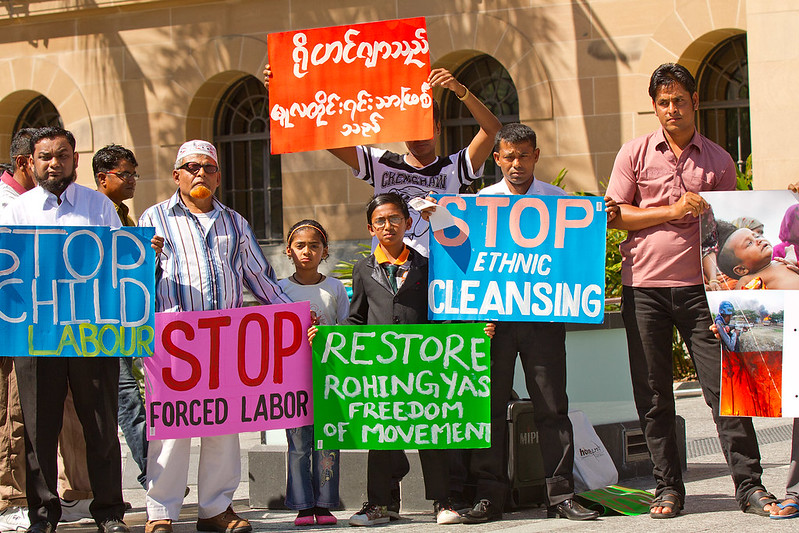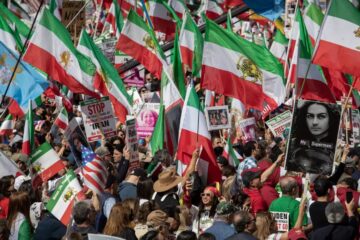
Discriminatory policies and laws that have targeted Rohingya Muslims living in Myanmar since the late 1970s, forcing thousands to flee their homes towards neighbouring Buddhist countries. Rohingya Muslims are an ethnic religious minority who practice the Sufi-inflicted variation of Sunni Islam. There are 3.7 million Rohingya dispersed worldwide, with one million, or a third of the total population, located in Myanmar’s Rakhine state. In the summer of 2017, the world watched in silence as thousands of Rohingya Muslims fled Rakhine for Bangladesh, Malaysia, and Thailand. Villages were burned, families were torn, and bodies were dumped in mass graves, in what is now classified as mass ethnic cleansing. At the time, the Myanmarese forces stated the operation they conducted was simply to reinstate stability in the country’s western region, but the United Nations (UN) confirmed that Myanmar’s intent was genocidal and pressured the leaders to put an end to the horrors. Even though the global community was quick to react and to condemn Myanmar for its actions, no concrete action was taken to help mend the situation, and unfortunately, eight years later, the situation is just as bad.
The case of Myanmar poses a difficult dilemma for the international legal system: despite having several legal frameworks, mechanisms, institutions, and the necessary evidence to pursue the state, the global response has mainly been symbolic. Institutions like the International Criminal Court (ICC) and the International Court of Justice (ICJ) have opened proceedings, and the UN have compiled an exhaustive amount of evidence to uncover the humanitarian abuses done by the Myanmarese forces towards the Rohingya Muslim group, yet the military forces proceed with to act with no consequences.
Despite assumptions, Myanmar’s humanitarian crisis did not begin in 2017. For decades, the country has been ruled, directly or indirectly, by a brutal military known as the Tatmadaw. Ethnic minorities have always faced persecution, and democratic resistance has constantly been destroyed. Even before 2017, the conditions in which the Rohingya lived were not great. The Myanmarese government institutionalised discriminatory laws on the Rohingya by imposing restrictions on marriage, education, religious choice, and freedom of movement. For example, the Rohingya Muslims are only allowed two children per family in the northern towns of Maungdaw and Buthidaung, and the Rohingya had to seek permission to marry, which may require them to bribe the authorities. In addition, according to the World Bank, Myanmar’s Rakhine state is the most underdeveloped area in Myanmar, with over 78 per cent of the population living in poverty, compared to the national average of 37.5 per cent. Widespread poverty in the region, the poor infrastructure, and a lack of employment opportunities have created a clear divide between Buddhists and Muslim Rohingya, which have erupted into conflicts.
The situation took a turn for the worse on February 1st, 2021, when the Tatmadaw, also known as the military junta, orchestrated a coup d’etat, which they declared as a “state of emergency”, seized power from the democratically elected government, and began a military operation. The military forces forcibly displaced several parliament members, such as leader Aung San Suu Kyi and President Win Myint, during their early morning raids in the capital, Naypyidaw. The democratically elected officials were present in the capital to convene after the November 2020 election, in which the National League for Democracy (NLD) won by a large majority.
After staging the coup, the Tatmadaw arrested NLD officials and civil society activists and proceeded to cut telecommunications and the internet. Since then, all protestors have been shot, journalists have been imprisoned, and thousands of political prisoners have been detained, tortured, and or killed.
The military has thus continued to not only persecute Rohingya Muslims, but also persecute all civilians who opposed their “state of emergency”, and try to go against them in any shape or form. Since the coup, the junta authorities have arrested over 16,000 pro-democracy protestors, and many former detainees have come forth and confessed that they were tortured, beaten, sexually harassed, and even raped while being detained by the military. Moreover, the military has consistently continued to carry out unlawful airstrikes harming civilians in its military operations against opposition and ethnic armed groups. Yet, despite the scale and the international community’s scrutiny towards the military junta, they face very few consequences.
The international legal response has been loud, but mostly ineffective. Even though the United Nations, the General Assembly, and the Human Rights Council have repeatedly condemned Tamdaw’s actions, and even though independent investigating bodies have compiled countless pieces of evidence documenting war crimes and crimes against humanity, these mechanisms lack enforcement power. The most that the international community can do is name and shame, but not prosecute. The UN Security Council’s ability to go forward with the Myanmar case has been hindered by the veto power of China and Russia, both ally states to Myanmar. The permanent members have blocked efforts to bring the case to the ICC or impose binding sanctions, completely blocking the Security Council’s ability to take action.
Several attempts to bring the case before the ICC were made throughout the years. On November 14th 2019, the Pre-Trial Chamber III of the International Criminal Court authorised the Prosecutor to investigate the alleged crimes within the ICC’s jurisdiction in the Situation in the People’s Republic of Bangladesh/Republic of the Union of Myanmar. However, the investigation was related to crimes committed against the Rohingya Muslims, but only if they were committed on Bangladeshi territory. Since Myanmar is not a party to the Rome Statute, the court’s jurisdiction is extremely limited, and thus cannot address crimes committed on Myanmar’s borders.
In November 2019, Gambia, with the help of the Organisation of Islamic Cooperation (OIC), filed a case, The Gambia v. Myanmar, before the International Court of Justice in The Hague. The case alleged that Myanmar’s atrocities against the Rohingya Muslims in the Rakhine State violated several provisions of the Convention on the Prevention and Punishment of the Crime of Genocide (Genocide Convention). Gambia, which ratified the Genocide Convention in 1978, brought the case forth under Article 9 of the Convention, which allows for disputes between parties “relating to the responsibility of a State for genocide” and related acts to be submitted to the ICJ. Later that year, the ICJ held hearings on Gambia’s request for provisional measures to protect the Rohingya Muslims remaining in Myanmar from genocide, which the court adopted unanimously in January 2020. In January of 2021, the Myanmar government, led by Aung San Suu Kyi, filed preliminary objections challenging the court’s jurisdiction and Gambia’s standing to file the case. Unfortunately, due to the military coup staged on February 1st 2021, any meaningful implementation is null. Nonetheless, the ICJ continues to hold public hearings on Myanmar’s preliminary objections.
The situation in Myanmar is critical, but it also exposes the gaps within the international legal system. Legal frameworks exist, but enforcement mechanisms are often weak and have no real jurisdiction since they often rely on states’ voluntary cooperation and mutual political alignment. Institutions such as the ICC and the ICJ operate under jurisdictional constraints, and UN bodies can be undermined by the veto power of Security Council members. These institutional weaknesses allow states like Myanmar to defy international norms and get away with committing war crimes. Investigations and court cases may produce a sense of moral victory, but without a proper follow-through, they fail to deter ongoing human rights abuses and deliver justice to survivors.
Edited by Iona Riga and Daniela Wheeler.




